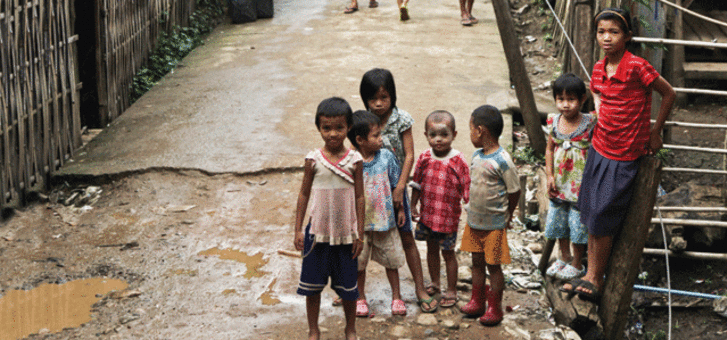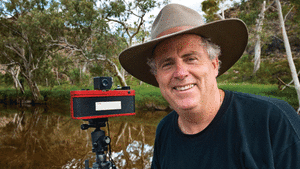He was only seven when the war started. He used to spend his time “running around and playing with my mates,” and then one day, the houses in his town started burning down and neighbours would go missing. His parents told him to stay indoors.
“That’s when I sensed that there was something actually going wrong,” says David Nyoul Vincent, who was born in Warrap state in South Sudan and arrived in Australia as a refugee in 2004.
Vincent woke up one morning to find that his next-door neighbour’s house had burned down. Not long after that, he would awake to find bodies strewn around the streets.
“My father came home one day and said, ‘We’re going to leave.’ We couldn’t leave with my mother, because she was pregnant at that time, so my father, my elder sister and I left her,” says Vincent, “and that’s how my journey started as a refugee.”
Every year, close to 14,000 refugees are granted asylum in Australia and New Zealand. Alistair Gee is from Act for Peace, the international aid agency of the National Council of Churches in Australia. Act for Peace first began its work with refugees in 1948, assisting Eastern European refugees to resettle in Australia after the Second World War.
“There are currently around 44 million forcibly displaced people worldwide, the highest number since the mid-1990s. Refugees are often the poorest of the poor, the most vulnerable and the most exploited,” says Gee.
![]() The journey
The journey
Two million people died as a result of the second Sudanese Civil War. The number of people in southern Sudan who were displaced (often repeatedly) was double that. Vincent’s family was one of them.
Father and son joined a group of fellow asylum seekers and walked barefoot for three months (Vincent’s father left Vincent’s sister behind with a family member, because he knew she would not survive the trek)—including a journey across the Sahara Desert—to a refugee camp in neighbouring Ethiopia.
“Every day, we would walk and then we would rest, and then walk again,” says Vincent, who was about eight when he made the journey. “We survived on wild food and wild leaves. We didn’t have anything. We didn’t even carry any belongings and there were lots of wild animals around."
“That close to the Sahara, with the heat, it was beyond pain. It was a complete struggle during that three months of walking. Not many people made it, especially young kids who were unaccompanied.”
In spite of his soft, gentle voice, Vincent is clearly audible and speaks with an interesting mix of an Australian and African accent. He has a calm and confident manner, which doesn’t falter, even when he recounts the horrors of his childhood and the almost two-decade long stay in refugee camps.
“The human body becomes resilient—one meal a day, no proper medication—my body as a refugee got used to that so [the refugee camp] became a normal home,” says Vincent.
Vincent’s first “home” in Ethiopia had no clean running water and the only meal they had a day consisted of boiled corn and beans. Cholera outbreaks were common—Vincent recounts the time when he and nine others were really sick with cholera and without medication. Vincent was the only one who made it through the night.
About four years later, Vincent was separated from his father because war broke out in Ethiopia. Vincent moved to a refugee camp in Kenya where he spent the next 13 years, before he was granted asylum in Australia.
It would be the year 2007 before Vincent saw his parents again.
A Christian response
“It is no accident that Christians and Christian organisations have long been committed to the care and support of refugees and others displaced by conflict and violence,” says Gee. “Christians should take an interest [in the welfare of refugees] and show love and compassion."
“From its very beginnings, the story of ancient Israel was the story of people in exile, of aliens resident in foreign lands suffering oppression and persecution, the story of desperate people fleeing famine, refugees fleeing brutality and enslavement.”
One such Christian to heed this call is John Horvath, a Seventh-day Adventist pastor in Western Australia. Horvath arrived in Western Australia in 2004 after working in church administration in Kiribati for several years. Since then, he has started 10 churches, most of them consisting of refugees from Croatia, Thailand, Burma and African countries like Sudan.
“I just talked to them on the streets, at the bus stop or say hello,” Horvath says when asked how his ministry started. “I help them settle into a house, give them a food parcel when they arrive and help them network with the others. We teach them how to drive, pick them up [to run errands] and help look after their kids too.”
Horvath talks about the difficulties refugees face when trying to settle in to a new country. It’s a sentiment echoed by Vincent, who although considered himself extremely lucky to be able to escape to Australia, said settling in was “beyond difficult.”
It wasn’t just because Vincent had limited English. “Just imagine coming from a refugee camp where everything is limited, where you don’t have the experience or knowledge about so many things. Then all of a sudden, you’re thrown into this place where there is everything."
“I had to learn how to catch public transport, how to get [and follow] directions and even something simple like shopping for vegetables. It was a nightmare.”
Definitions
The office of the United Nations high Commissioner for Refugees (UNhCR) defines refugees as those who have a “well-founded fear of being persecuted for reasons of race, religion, nationality, membership of a particular social group or political opinion, is outside the country of his [or her] nationality and is unable, or owing to such fear, is unwilling to avail him [or her]self of the protection of that country; or who, not having a nationality and being outside the country of his [or her] former habitual residence as a result of such events, is unable or, owing to such fear, is unwilling to return to it."
Part of the community
Thanks to people like Horvath and organisations like Act for Peace, refugees are starting to find their feet in their newly adopted country.
Act for Peace’s Healing Trails program even gives refugees the opportunity to share their stories with local communities.
Vincent participated in the program and says it helped “emotionally and mentally. It makes you revisit your past and find your strength in there, knowing that there are people who are listening.”
The program helps connect local communities with refugees. “It helps to demystify some of the negative media reports about refugees. The community really begins to understand the plight of the refugee and they become strong supporters of the refugee cause,” says Gee.
For refugees, leaving a refugee camp is only the beginning of a new journey. In a new country, they will often struggle with cultural shock and loneliness, while having to face the unknown, unfamiliar and strange.
But with only one per cent of refugees resettled around the world each year, and with the average time spent in a refugee camp before repatriation or resettlement at 17 years, the new journey, while difficult, is at least filled with hope.
Bible "refugees" our example
- Abraham was forced to leave his home in Canaan because of famine, lived as a resident alien in Egypt before fleeing to Egypt as a result of mistrust and suspicion directed against him, then journeyed through foreign lands until he settled by the oaks of Mamre in Hebron (Genesis 13:18).
- Isaac lived in the land of the Philistines until driven out (Genesis 26).
- Jacob fled famine in Canaan to go to Egypt, just as Abraham had done, and eventually settled back in the land of Canaan, “where his father had lived as an alien” (Genesis 37:1).
- Joseph spent years enslaved in Egypt until he secured his release, gained the trust of Pharaoh and eventually became powerful and rich.
- Moses led an enslaved people out of Egypt to wander in the desert for 40 years before they saw the promised land of Canaan across the river Jordan. this was not, however, the end of exile and enslavement for the Israelites. They were captive under the empires of the Assyrians and exiled by the Babylonians.
The Israelites were the people freed by a God who hears the cries of those in the wilderness, who stands with those who suffer exploitation in a foreign land, and who calls for justice for the weak and the vulnerable. God also calls us to care for refugees, one of the most marginalised people in society:
- “When an alien resides with you in your land, you shall not oppress the alien. the alien who resides with you shall be to you as the citizen among you; you shall love the alien as yourself, for you were aliens in the land of Egypt: I am the Lord your God” (Leviticus 19:33, 34).
- “Cursed be anyone who deprives the alien, the orphan and the widow of justice” (Deuteronomy 27:19).







